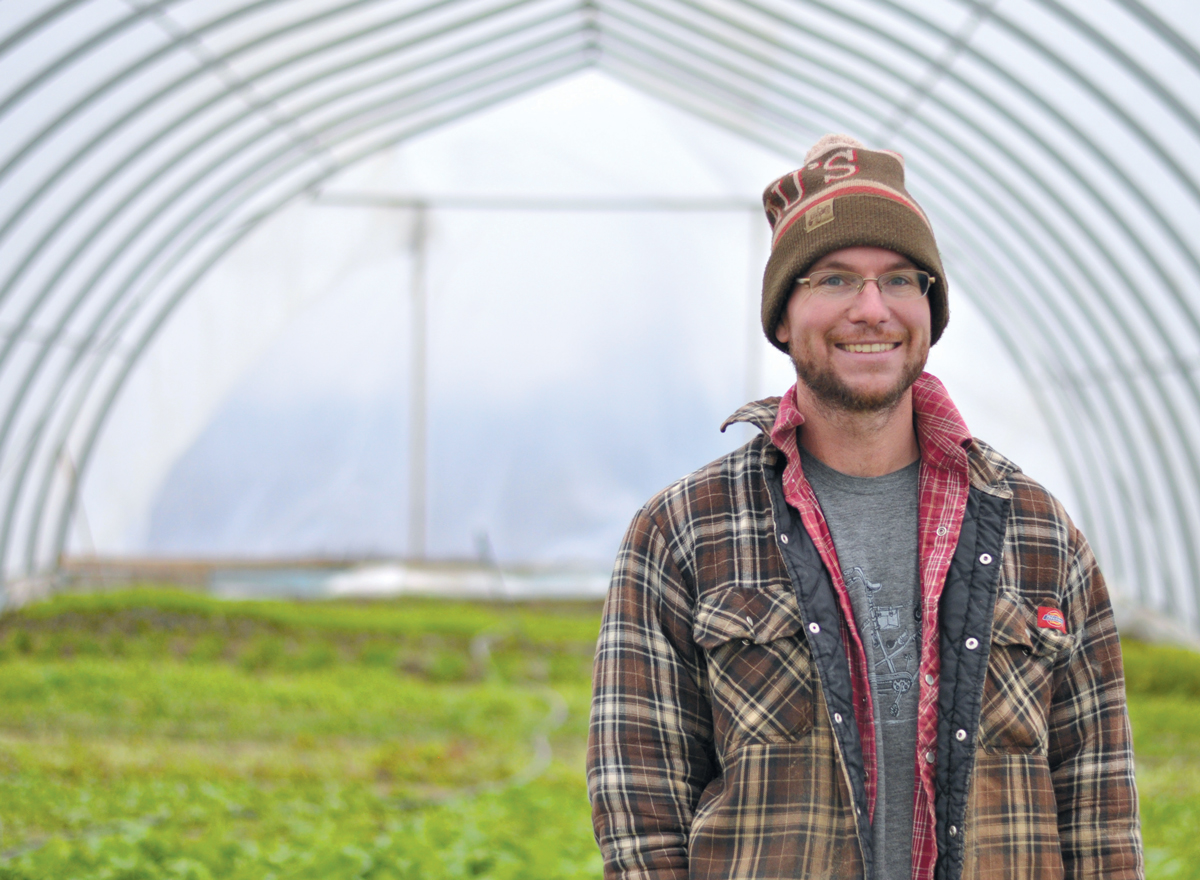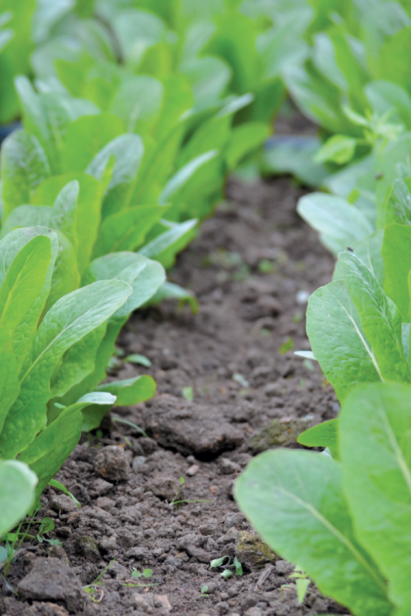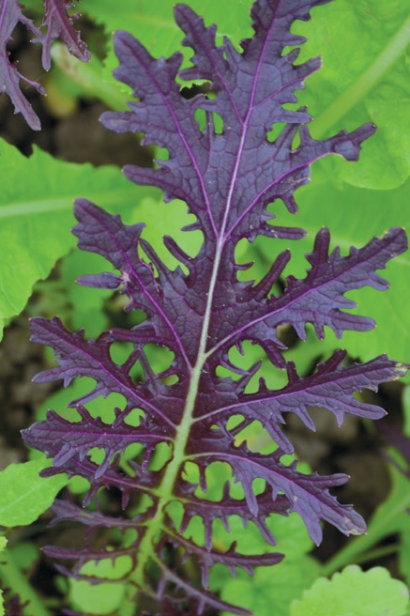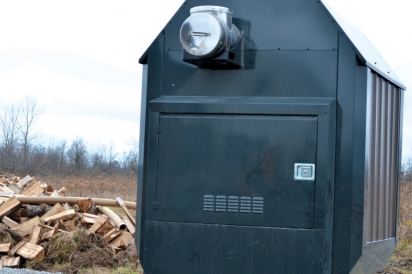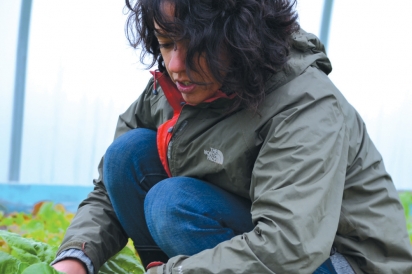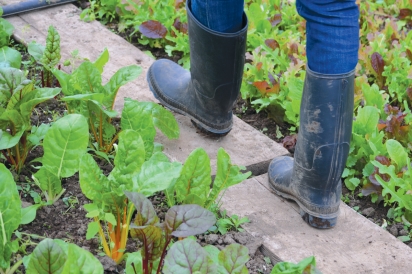At Bluegrass Farm
Attention all lovers of fresh vegetables! Winter-long production of fresh, locally grown salad greens is ramping up in the Ottawa region, thanks to a determined young family at Bluegrass Farm. The benefit of having access to fresh, local greens in the dead of winter needs no explaining, says co-owner Leela Ramachandran, “The idea sells itself.”
With the launch of a brand-new winter community shared agriculture program (CSA), Bluegrass Farm provides its members with twice-monthly deliveries of greens and seasonal vegetables from November to February. So far, it has sold a whopping 70 CSA shares for the 2014-15 season, and has even more customers on a waiting list. The farm also supplies restaurants such as Fauna Food + Bar, Gezellig, the café at West End Well and others.
Farming on family land between Smiths Falls and Merrickville, Ramachandran and her partner Brad Wright are among a handful of producers to embrace winter-long greens cultivation. They may also be the first in the area to do so by heating their four greenhouses with a custom-designed, radiant-heat system that combines and adapts elements of residential and typical greenhouse installations.
Running on a wood-fired boiler, the heating system warms the soil instead of the air, keeping it at about 10C with the help of row covers and ventilating fans. In this controlled environment, Ramachandran and Wright cultivate a wide variety of cool-loving greens (lettuces, kale, spinach, Asian greens, spicy mustard greens, parsley, cilantro and more) that grow back after harvesting to maximize production in limited space.
In addition to salad greens, Bluegrass CSA members receive an assortment of the farm’s field crops including leeks, garlic, onions, parsnips, carrots, beets, potatoes, winter squash, and brassicas. Selecting crops that store well, the couple keeps field harvests fresh with the help of a cold storage unit they bought from government surplus that, oddly enough, had once housed microfiche.
Although this is the first year for their winter CSA, Wright and Ramachandran bring to it a wealth of experience in market gardening, farm management and sustainability. They met while pursuing their master’s degrees in environmental studies at the University of Waterloo. After graduating, they worked in the public sector, but neither felt entirely satisfied. “Instead of being part of some big machine, we wanted to have direct impact at the community level,” Ramachandran explains. Past involvements with community gardens, along with their training in environmental science, turned the couple towards organic vegetable farming.
The goal was to own their own farm, so Wright first apprenticed with Juniper Farms in Wakefield while co-managing another farm, and then operated a 50-share CSA program for Chelsea Gardens. For the past two years, he and Ramachandran have run the Just Food Farm Start-up Program, which supports new farmers in the region.
When they began looking at business models for winter vegetable production, Wright travelled to Vermont, where winter CSA programs are more common. “Burlington, Vermont is a real epicentre of the local food movement,” Wright says. “You see posters in every coffee shop for all kinds of CSAs— vegetables, meat, herbal medicines — it’s straight out of Portlandia.” Local farmers were very open, he says, and provided information that helped him and Ramachandran plan and begin building their own operation.
“The whole process was epic,” Ramachandran admits. For example, to install the radiant heating system, 220 holes had to be drilled in the limestone bedrock that the farm sits on. The shallow soil cover had to be built up over the heat and insulation apparatus and enriched to organic standards. The large-scale, high-efficiency wood boiler had to be hooked up. In addition, Wright had to transport the modular, insulated cold storage unit from Toronto in a U-Haul and re-assemble it on the farm.
Despite the demands of launching a CSA, working at Just Food and raising their two-year-old son, Hayden, Ramachandran and Wright have lots of plans for the future. Among other things, they want to boost vegetable production to eventually offer a 100-plus member CSA, and help strengthen the network of small-scale producers in the area. Once winter is over, the couple plans to use the greenhouses for growing vegetables such as tomatoes, eggplant and peppers, for farmers' markets and restaurants.
Wright wants to build on his work growing heritage grains for the Bauta Family Seed Initiative and expanding into organic production of malt grains for local craft brewers. An advocate of land stewardship, he’s also keen to return the farm to the types of vegetation that encourage pollinators and provide habitat for endangered or threatened species, such as the loggerhead shrike, the eastern meadowlark and the bobolink.
In the meantime, the couple’s priority is to make sure that Bluegrass Farm’s first season is a success. When their contracts with Just Food expire at the end of 2014, they’ll start farming full-time. “We’ll be giving it 110 percent of our efforts,” Ramachandran says. “It’s terrifying, but it’s exciting, too.”
Bluegrass Farm
714 Kinch St., Jasper, ON
BluegrassFarm.ca, 613.275.2639


